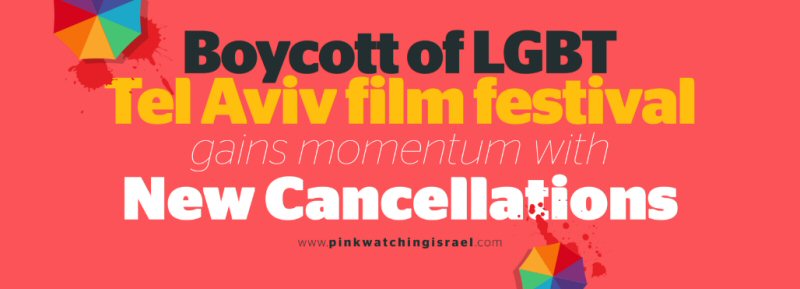Four more filmmakers have joined a growing number of artists boycotting the Tel Aviv LGBT International Film Festival (TLVFest), in response to a Palestinian call.
Five artists had already cancelled their participation prior to the start of the festival, which runs between May 31 and June 9. With the latest cancellations, from two French directors and two from the Spanish state, a total of nine artists and filmmakers have boycotted the festival this year.
Despite the cancellations, TLVFest has refused to remove the filmmakers’ films from the festival’s schedule. In a statement to an Israeli daily, the festival director Yair Hochner said, “Whoever canceled, canceled. As far as we are concerned the festival will continue normally.”
French directors Océane Michel and Cyprien Vial had two scheduled screenings of their comedy film, “Embrasse-moi!”. Océane, who also makes his acting debut in the movie, posted on Facebook:
I wrote to the Festival two days ago but my message seems not to have been understood as my movie is still listed on the program.
I stand in solidarity with the Palestinian people and express my total disagreement with Israel’s policy towards Palestine. For this reason, I refuse to take part in the pinkwashing strategy of the Israeli government. I want my movie withdrawn from the festival.
I apologise to the audience of the festival because civilians are equally victims of their government. I make an absolute distinction between Israeli citizens and their government, but violence against Palestinians, including LGBT people, by the army and the state forces me to withdraw from the program.
Likewise, Spanish director Dany Campos told Pinkwatching Israel – a collective of Palestinian queers for Boycott, Divestment and Sanctions (BDS) – that he is withdrawing his short, “Flaw,” from the Festival’s “B Shorts” category.
Director Fabia Castro announced her support for the cultural boycott of Israel in addition to withdrawing her short, “Tres”:
After learning about the very serious situation of oppression Palestinians live under, a regime of colonialism and apartheid, I refuse to let my art be used to whitewash Israel’s image. … I reject attempts by Israel to use the rights and struggles of LGBTQ+ people to normalize their image….
… Today, I add my voice to dozens of artists who, in the last few weeks, have joined the Boycott, Divestment and Sanctions movement for the rights of the Palestinian people.”
Meanwhile Sylvain Coisne who had already announced the cancellation of his short, “Dylan, Dylan,” issued a statement on Facebook explaining his reasons for cancelling.
The wave of boycotts of TLVFest follows Israel’s latest massacres in Gaza, where Israeli forces killed more than 117 unarmed Palestinian protesters, including 13 children, and injured more than 13,000, leaving many with life-changing disabilities. Amnesty International has condemned Israel’s shoot-to-kill-or-maim policy and Human Rights Watch described the killings as “unlawful and calculated.”
Last year, TLVFest was hit with a similar wave of cancellations, including of South African director John Trengove.
Haneen Maikey, director of alQaws for Sexual & Gender Diversity in Palestinian Society, welcomed this year’s cancellations:
Palestinian queers feel inspired by this wave of international solidarity at a time when world governments continue to fuel Israel’s impunity and war crimes. The scale of cancellations for the second year in a row are yet another sign of how Israel’s pinkwashing strategy is failing.
There is a greater awareness worldwide about how Israel uses LGBTQ rights to justify its violent policies. Moreover, TLVFest’s management has shown its true face by declining to honor the requests from the directors to remove their work from the Festival’s program, they should do so now.
Hind Awwad, from the Palestinian Campaign for the Academic and Cultural Boycott of Israel (PACBI), commented:
We have noticed that many of the directors that were approached were not aware that their movies were scheduled to be shown at TLVFest. This is due to contractual arrangements with distributors who place the movies in international festivals without necessarily checking with filmmakers. Distributors should respect the wishes of directors who support the cultural boycott of Israel. The tide is changing for the support of Palestinian rights in the art world. The industry should reflect these changes.
The Palestinian Campaign for the Academic and Cultural Boycott of Israel (PACBI) was initiated in 2004 to contribute to the struggle for Palestinian freedom, justice and equality. PACBI advocates for the boycott of Israeli academic and cultural institutions, given their deep and persistent complicity in Israel’s denial of Palestinian rights as stipulated in international law. Visit PACBI at https://bdsmovement.net/pacbi and follow them on Twitter @PACBI

